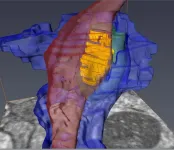“A call to address structural barriers to the representation of Hispanics/Latinos in clinical trials on Alzheimer's disease and related dementias: A micro-meso-macro perspective,” was led by first author María P. Aranda, Ph.D., MSW, MPA, of the University of Southern California, and supported by interdisciplinary experts in health equity and disparities research, Latino studies, public health, and clinical trials.
“There has been too much onus, even blame, put on Latino individuals and families,” Aranda said. “But when researchers ignore micro-level details, it results in macro-level exclusion of Latinos from clinical trials. For example, Latinos’ expectation of personalismo -- the quality and trustworthiness of interpersonal interactions -- can be thwarted when their time with providers (and by extension researchers) in the care visit or encounter is brief or hurried.”
“Structural obstacles are more potent and impactful than individual or family obstacles, and have more significant and long-lasting influence on the representation of Latinos in Alzheimer’s research,” Aranda added. “For example, it is counter-productive and disheartening to see weak commitment to inclusive resources and staffing, evidence-based recruitment strategies, and broad and transparent dissemination repeatedly rewarded. This has to stop.”
Recommendations to enhance and secure Latino AD/ADRD (Alzheimer’s Disease and Related Dementias) clinical trial participation
1. Make binding all diversity plans at the Food and Drug Administration (FDA) for AD/ADRD clinical trials.
2. The National Institutes of Health (NIH) to continue to require robust initiatives and diversity plans for all AD/ADRD clinical trials.
3. Issue a call to pharma partners and clinical research organizations to address structural factors that inhibit Latino representation in AD/ADRD clinical trials.
4. Honor Latino representation throughout the design of the clinical trial.
5. Shift to — and embed — operations within Latino communities and settings.
6. Focus on Latino participants’ healthcare needs and preferences for information.
7. Creatively address limited literacy in English and Spanish.
8. Dissemination of findings should require information on sample representativeness.
9. Expand research initiatives to include diverse cohorts and etiologies related to cognitive health based on what matters most to Latinos.
10. Support national legislation promoting trial participation of underrepresented groups.
According to the Alzheimer’s Association’s Alzheimer’s Disease Facts and Figures 2023, older Latinos are about one and one-half times as likely to have Alzheimer's or other dementias as older Whites. Latinos are the largest minoritized racial/ethnic group in the United States, comprising 19% of the population. Latinos account for half (52%) of the nation’s population growth, and are expected to increase from 62.5 million to 111 million people by 2060. Yet, in the 200+ clinical trials conducted with more than 70,000 U.S. Americans, Latinos comprise only a small, unrepresentative fraction of trial samples. Closing the racial and ethnic disparity gap in AD/ADRD trials is clearly "good science."
“In this new era of approved treatments for Alzheimer’s, the need to diversify clinical trial cohorts is critical and long overdue,” said Carl V. Hill, Ph.D., MPH, Alzheimer’s Association chief diversity officer and a co-author of the article. “We must ensure that treatments are safe and effective for individuals who are disproportionately affected and underserved, and the same need is there for proper representation of these communities in research on risk factors, diagnosis, care, prevention and all other dementia science topics.”
According to the authors, current efforts to engage and recruit Latinos into Alzheimer’s/dementia research typically address individual- and family-level factors such as language, cultural beliefs, knowledge of aging and memory loss, and logistical and travel considerations. This results in diminished attention to upstream institutional- and policy-level barriers, where decisions around scientific policies and funding are ultimately made.
“As the largest research funder and the two most influential government agencies in the field, the FDA and NIH are both the most accountable and the most able to take the lead in addressing these issues, and changing the historical imbalances and inequities,” Aranda said. “The third key player is the pharmaceutical industry, which also has deep pockets and which recruits the most clinical trial participants.”
The authors present a novel theoretical framework — the Micro-Meso-Macro Framework for Diversifying AD/ADRD Trial Recruitment — that focuses on reducing multi-level barriers and their impact on U.S. Latino recruitment into Alzheimer’s clinical trials. The framework incorporates three levels of barriers, but with an enhanced focus on institutional (meso-level) and policy (macro-level) dimensions. (Micro-level = individual and family factors)
Meso-level (institutional) barriers impact the infrastructure available to conduct clinical trials, including the way clinical trials are designed, budgeted and managed. These include:
Limited funding for the recruitment of underrepresented populations. Lack of a bilingual/bicultural workforce. Inability to recruit people with lower educational levels, including poor health literacy. Lack of remuneration for the personal costs needed to participate.
Macro-level (policy) barriers involve funding and regulatory bodies that create and regulate Alzheimer’s clinical trials, plus those that report study results. Obstacles at this level include:
Executives responsible for making funding and regulatory decisions have a limited representation of Latinos. Treatments are approved by the FDA even if they have not been sufficiently tested with diverse, representative populations. Scientific and professional journals and conferences under-report or ignore sample composition and representativeness. Sponsors continue to rely on academic research settings with weak track records in recruiting underrepresented groups.
The authors acknowledge that U.S. Latinos are diverse regarding country of origin, cultural beliefs, income and educational levels, acculturation level, and Alzheimer’s risk factors. There is no “one-size fits all” approach; strategies will need to be tailored to local community contexts and lived experiences.
About the Alzheimer’s Association®
The Alzheimer’s Association is a worldwide voluntary health organization dedicated to Alzheimer’s care, support and research. Our mission is to lead the way to end Alzheimer’s and all other dementia — by accelerating global research, driving risk reduction and early detection, and maximizing quality care and support. Our vision is a world without Alzheimer’s and all other dementia®. Visit alz.org or call 800.272.3900.
# # #
END




